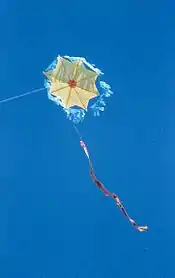pūķis
See also: pukis
Latvian
FWOTD – 4 October 2012
.jpg.webp)
Pūķis (2)

Pūķis (3)
Etymology
Borrowed from Old Norse púki (“demon, evil spirit”), from Proto-Germanic *pūkô; compare Swedish puke (“house spirit”).[1]
Pronunciation
- IPA(key): [pūːcis]
Noun
pūķis m (2nd declension)
- (mythology, religion) in old Latvian mythology, a household spirit that could be bought, bred, or stolen, and protected the wealth of his owner
- naudas pūķis ― money pūķis
- mantas pūķis ― property pūķis
- dragon, winged serpent (reptilian monster that spits fire and devours people and animals)
- pūķis ar deviņām galvām ― a dragon with nine heads
- pūķa gads ― the year of the dragon (Chinese calendar)
- kite (toy made usually of colored paper that flies in the air, and is controlled from below with a line)
- papīra pūķis ― paper kite
- daudzplākšņu pūķi ― multiplane kites
Declension
Declension of pūķis (2nd declension)
See also
References
- Karulis, Konstantīns. 1992, 2001. Latviešu etimoloģijas vārdnīca. Rīga: AVOTS. →ISBN.
This article is issued from Wiktionary. The text is licensed under Creative Commons - Attribution - Sharealike. Additional terms may apply for the media files.